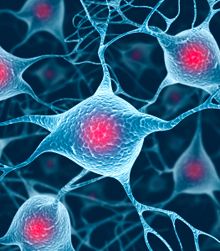9 April 2015. A new treatment in development for Alzheimer’s disease was designated an orphan drug for Fragile X syndrome, an inherited neurological disorder, by the U.S. Food and Drug Administration. Neurotrope BioScience Inc. in Newark, New Jersey, received the designation for its drug bryostatin, now in clinical testing to treat Alzheimer’s disease.
Fragile X syndrome is a genetic condition that results in intellectual disability, behavioral, and learning difficulties such as general and social anxiety, with identifiable physical symptoms, such as long face and connective tissue problems. The condition occurs in both genders, but males are affected more than females, and with greater severity. Fragile X syndrome affects about 1 in 4,000 males and 1 in 8,000 females.
Neurotrope is the developer of bryostatin, a drug in development that activates protein kinase C-epsilon, an enzyme that regulates a range of human functions and associated with a number of disorders when missing or limited, including cancer. Protein kinase C-epsilon works through a complex pathway, but when activated under some conditions is believed to reverse nerve damage that occurs in Alzheimer’s patients. Bryostatin is currently in intermediate-stage clinical trials as a treatment for Alzheimer’s disease.
Neurotrope was founded in 2012 to commercialize therapies and diagnostic technologies developed from research conducted at Blanchette Rockefeller Neuroscience Institute at University of West Virginia. Protein kinase C-epsilon activators are among those discoveries licensed by Neurotrope for Alzheimer’s disease treatments, but also for other neurodegenerative disorders, including Fragile X syndrome.
Preclinical studies of bryostatin, says the company, show promise as a treatment for Fragile X syndrome. Daniel Alkon, Neurotrope’s chief scientist, says in a company statement, “We are very encouraged by the preclinical data we acquired in a Fragile X mouse study that suggests treatment with bryostatin can mature synapses and increase the number of synaptic connections resulting in improved learning and memory.” Alkon is also scientific director at Blanchette Rockefeller Neuroscience Institute.
Orphan drug designation is granted to treatments being developed for diseases affecting fewer than 200,000 people in the U.S. Therapies, both drugs and biologics, designated as orphan drugs qualify for incentives such as 7 years of market exclusivity, tax credits for clinical trials, and exemptions from marketing application fees.
Read more:
- Neuro Disease Biotech Raises $20M in Early Funds
- Neuropore, UCB Partner on Parkinson’s Drugs
- Calico Licenses Neurodegenerative Disease Compounds
- Neurodegenerative Therapies Start-Up Gains $4.8M Seed Funds
- Daiichi Sankyo, UCSF Partner on Neurodegenerative Disorders
* * *


 RSS - Posts
RSS - Posts
You must be logged in to post a comment.